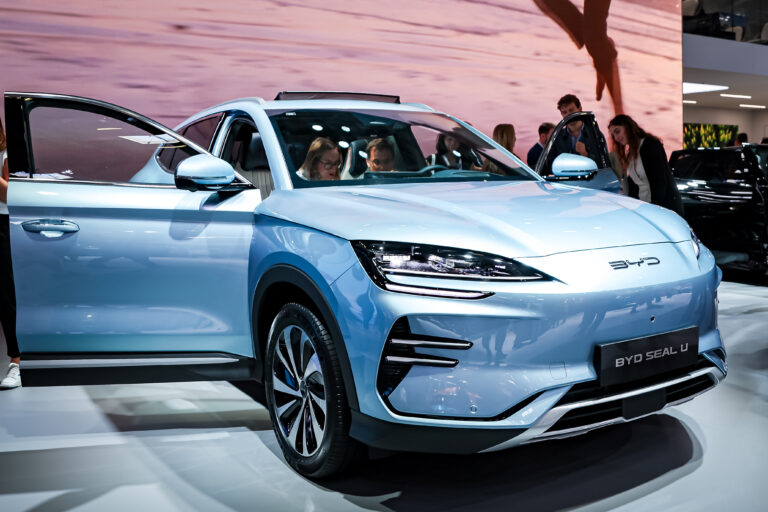The BYD Seal U electric vehicle is displayed at the IAA Mobility 2023 International Motor Show in Munich, Germany on September 6, 2023.
Leonhard Simon | Getty Images News | Getty Images
Chinese electric vehicle startup BYD is expected to overtake Tesla in battery electric vehicle sales this year, seeing its BEV market share soar, according to information released by Counterpoint Research on Tuesday.
“This shift highlights the dynamic nature of the global EV market,” Counterpoint analysts said in a report.
BYD’s battery-electric sales rose about 21% to 426,039 units in the second quarter compared with the same period last year, according to CNBC calculations. Tesla’s deliveries fell 4.8% to 443,956 units in the second quarter.
Last year, BYD’s total production (including battery-only and hybrid vehicles) exceeded 3 million vehicles, outperforming Tesla’s production of 1.84 million for the second consecutive year.
However, BYD produced 1.6 million battery-only cars and 1.4 million hybrids, putting Tesla at the top of BEV production.
BYD also lost its top spot as an EV vendor to a major U.S. EV manufacturer in the first quarter.
Counterpoint said China “remains the dominant force in the BEV market,” with BYD leading the way. China’s BEV sales are expected to be four times that of North America by 2024, according to the research firm.
According to Counterpoint, China is expected to maintain more than 50% of global BEV sales until 2027, and by 2030, Chinese BEV sales are expected to surpass those of North America and Europe combined.
The European Union announced last month that it would impose additional tariffs on Chinese EV companies to address a “clear, foreseeable and imminent threat of harm to EU industry.”
BYD will be subject to a 17.4% tariff, Geely a 20% tariff, and SAIC will have to pay the highest tariff of the three, a 38.1% tariff, on top of the standard 10% tariff already imposed on imported EVs.
The tariffs are currently temporary but will take effect from July 4 if no resolution is reached in talks with Chinese authorities, the commission said in a statement on June 12.
“The EU’s new tariffs on Chinese-made EVs are aimed at levelling the playing field for European EV makers struggling to compete with cheaper Chinese imports,” said Liz Li, associate director at Counterpoint Research.
“These tariffs could push Chinese automakers to seek out emerging markets such as the Middle East, Africa, Latin America, Southeast Asia, Australia and New Zealand,” Li added.
According to the report, global BEV sales are forecast to reach 10 million in 2024, coinciding with a continued decline in internal combustion engine vehicles. This growth will be supported by efforts to improve the cost efficiency and affordability of EVs and EV batteries.
–CNBC’s Evelyn Cheng contributed to this report.

